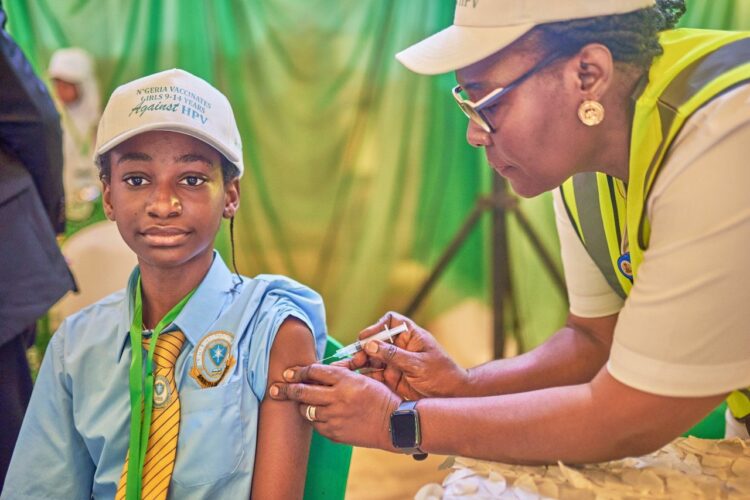Nigeria has officially incorporated the human papillomavirus vaccine (HPV) into its routine immunization system, with the aim of reaching a record 7.7 million girls in a single round of vaccination, marking the largest endeavour of its kind in the African region.
The Coordinating Minister of Health & Social Welfare, Muhammad Ali Pate, voiced his deep concern, stating that; “The loss of about 8,000 Nigerian women yearly from a disease that is preventable is completely unacceptable.”
Pate emphasised that saving lives and ensuring quality health outcomes were central to the Renewed Health Agenda of President Bola Ahmed Tinubu.
He also shared a personal perspective, saying, “As a parent myself, I have four daughters, all of them have had the same HPV vaccine to protect them against cervical cancer.
“I’d like to implore fellow parents to dutifully ensure that this generation of our girls disrupt the preventable loss of lives to cervical cancer in addition to other untold hardship, loss, and pain.”
Girls between the ages of 9 and 14 will receive a single dose of the HPV, which has demonstrated remarkable efficacy in preventing infection with HPV types 16 and 18, known culprits in at least 70% of cervical cancer cases.
Cervical cancer ranks as the third most prevalent cancer in Nigeria and the second most common cause of cancer-related deaths among women aged 15 to 44.
World Health Representatives (WHO) Representative in Nigeria, Dr. Walter Kazadi Mulombo, said: “This is a pivotal moment in Nigeria’s efforts to lower the burden of cervical cancer – one of the few cancers which can potentially be eliminated through vaccination.
“We’re committed to supporting the government increase access to the HPV vaccine to protect the health and well-being of the next generation of women.”
Nigeria’s decision to prioritise the addition of the HPV vaccine to the national immunization program aligns with WHO recommendations for countries where cervical cancer is a significant public health concern and cost-effective vaccine implementation is feasible.
UNICEF has played a crucial role in this initiative, procuring nearly 15 million HPV vaccines on behalf of the Government of Nigeria. In addition to this, UNICEF has produced informative materials, including radio and TV jingles in multiple local languages to dispel misinformation and rumors.
The inaugural phase of the vaccination campaign spans five days, encompassing schools and communities across 16 states and the Federal Capital Territory (FCT).
Subsequently, the vaccine will become a part of the routine immunization schedule within healthcare facilities. The second phase is scheduled to commence in May 2024, encompassing 21 states.
The HPV vaccine is available free of charge, provided by the Federal Ministry of Health, with support from GAVI, the Vaccine Alliance, United Nations Children’s Fund (UNICEF), WHO, and other collaborative partners.











